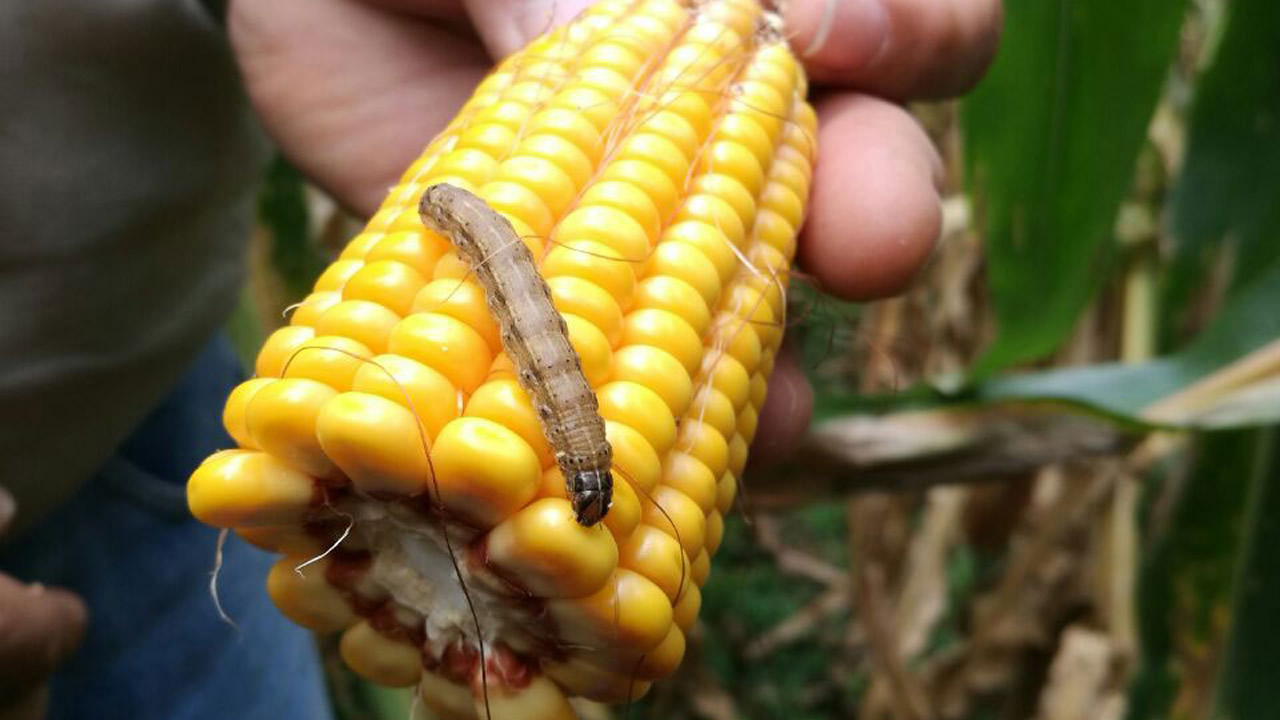
After affecting maize plantations in Rodrigues, the Fall Army Worms have now propagated in the maize fields in Mauritius. Officers of the Food and Agricultural Research and Extension Institute (FAREI) have increased surveillance in order to prevent the proliferation of the worms.
Since the past two weeks, the presence of Fall Army Worm has greatly affected maize plantations in Rodrigues. The fields were placed in quarantine. Nevertheless, at the beginning of this week, authorities reassured that the situation is under control in Rodrigues and a Crisis Committee was set up by the Ministry of Agro-Industry. Instead of destroying, the Ministry decided to treat all the affected crops.
However, last Thursday 28th March, officers of the Ministry suspected the presence of these worms in maize crops in Mauritius, as traces were discovered in a field at Belle Vue Maurel. Larvae samples were collected and sent to laboratories to confirm if the traces on those crops were that of Fall Army Worm. It was indeed found that nine fields were affected in Mauritius by the worm. According to sources, only small-scale maize plantations were affected.
At the beginning of this week, officers of the Ministry of Agro-Industry identified a total of eleven sites that have been affected by the worm mainly small-scale corn plantations. The officers of the Ministry and of the Food and Agricultural Research and Extension Institute (FAREI) met on Monday 1st April to discuss on the matter and to find out solutions on how to tackle the situation. Minister Mahen Seeruttun stated that the authorities requested the help of a South African expert from the Food and Agriculture Organization (FAO) to avoid further spread of the worm in Mauritius and Rodrigues.
28 crops affected
Solicited for an update on the situation, Dr. Ganeshan Seelavarn, Chief Executive Officer of the Food and Agricultural Research and Extension Institute (FAREI), revealed that 28 fields have been affected by the Fall Army Worm so far. “We have identified the worm in 28 fields. These are uniquely maize crops found across the island except in the West,” he utters.
He states that measures have been taken to prevent the spread of these worms in the fields concerned and to prevent other crops on the island from being affected, too. “Some 40 acres of crops have already been treated through insecticide spraying exercises on Sunday last and Monday last. Yesterday (Thursday) and on Friday 5th April, there will be additional spraying exercises. We have also installed some 1,500 traps in crops in order to catch the moths (adult worms). Our teams are working hard as we see that the management system is working well.”
Dr. Seelavarn utters that the situation is worrying but is under control. He trusts that the Fall Army Worm will not affect other crops like sugarcane and others as long as they are controlled. “We are proceeding to insecticide spraying in the crops rather than destroying them. If we destroy the affected maize plantations, there is the probability that the worm would then spread into other plantations,” he explains.
Regarding the origin of the worm, the latter states that it is difficult to know. “We cannot certify for sure from where and how the worm has spread into maize crops. There are various possible pathways but we cannot say for sure where they come from.”
He advises planters and the public in general to alert the FAREI in case they suspect the presence of Fall Arm Worm in crops and vegetations. “We do not want planters to use all kinds of pesticides. There are specific products. It is better that they contact us and we will proceed to the disinfection. This will also help us identify new affected sites and better control the situation,” he said.
Planters should call the following numbers if they spot the presence of Fall Army Worms:
- FAREI: 5 253 1715
- NPPO: 5 256 2541
- Entomology Division of Agricultural Services: 5 7783455
Minister Mahen Seeruttun: “Other crops are threatened”
In an interview with Le Défi Quotidien, the Minister of Agro-Industry Mahen Seeruttun stated that other crop plantations are threatened by the Fall Army Worm. “It is clear that once the caterpillars have devastated the cornfields, they will attack other crops. In Rodrigues, I saw caterpillars in mint plants. They must be eliminated before they attack other cultivations,” he said.
He also underlined that the Ministry, working closely with officers of FAREI, is handling the situation by spraying insecticides including traps for moths. “The moths must be eliminated so that they do not lay eggs. The caterpillar turns into moth after 25 days. They live only for three days.” Regarding the means of how the worm was introduced in Mauritius, he explained that it is more likely that it arrived by plane or boat. “We know that moths can travel long distances. But the most likely thesis is that they arrived by plane or by boat that take less than three days to arrive in Mauritius.”
 J'aime
J'aime














